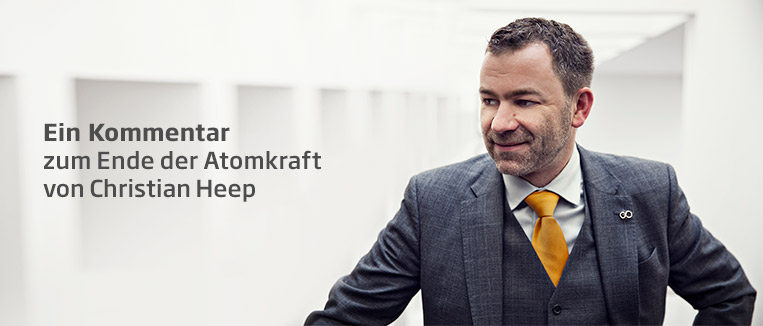
A commentary on the end of nuclear power
Column / Commentary by Christian Heep
Germany. Today, on 15 April 2023, the last three nuclear power plants will be taken off the grid. A remarkable success for environmental and anti-nuclear activists and the result of a long culture of protest. However, the debate on the pros and cons of nuclear power continues and is still being fuelled by nuclear advocates. They believe that decommissioned reactors should be allowed to be reactivated at a later date. Crazy. Long-disproved, flimsy and populist arguments that do not stand up to a fact check are being used here, the most expensive electricity generation costs and the lack of final storage problems are being completely disregarded and the single-digit share of the global decline in total electricity production bears no relation to the safety risks during operation and the general dangers of an uncontrollable civilian use of nuclear power.
The discussion about the usefulness of nuclear power plants and the desire to hold on to the fossil fuel age has long since lost its meaning to me.
The expansion of fossil fuels will continue to be financed and a massive expansion of climate-damaging fuels will be supported. This is how protectionism works – not the future. A coal phase-out has been botched or postponed to the distant future, villages are still being cleared and dredged up today, a hydrogen age is being promoted, pollutant-emitting eFuels are supposed to save the combustion engine and all this unsustainable activism is vehemently preventing what could lead us to a green economy and will be the energy basis of the future: the rapid and consistent expansion of renewable energies. Alongside measures for significantly greater energy efficiency and innovative storage systems, this is the basis of our energy supply, our opportunity to become climate-neutral, to meet climate targets, to make ourselves more independent – especially in the face of the current energy crisis – and to preserve jobs, value creation and prosperity. Federal Chancellor Olaf Scholz has described this transformation process as the task of the century and it is to be hoped that he can develop the necessary assertiveness for the upcoming political change of direction – instead of allowing fossil interests and a purely climate-driven industrial policy, including that of small splinter parties, to further slow down and hinder these changes as much as possible.
A look at the technological innovative strength of our member companies in the German eMobility Association, products ready for series production and future-proof processes and solutions is not only encouraging, but also clearly shows that a green economy is economically viable and resilient. Together, the energy and mobility transition are the key to a whole range of sustainable scenarios, opportunities and challenges that can lead us and our children as a whole to a more liveable future and are capable of drastically reducing our impact. Politics must now finally unleash its full potential in terms of steering effect and we should say goodbye to the protectors of an old world as quickly as possible – and with all clarity.
The old dogmas must go and be prioritised by new ones: Sustainability, decarbonisation, energy self-sufficiency and energy efficiency.



